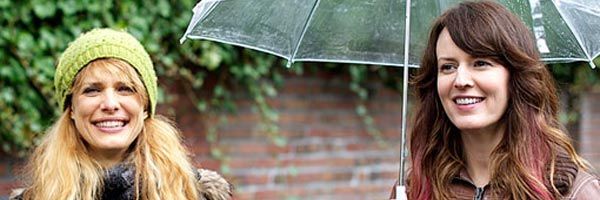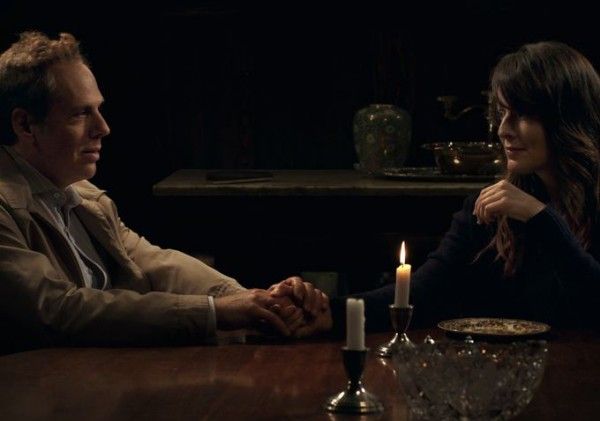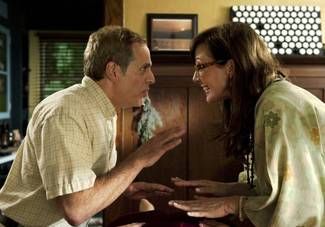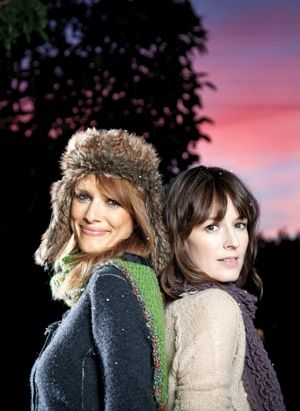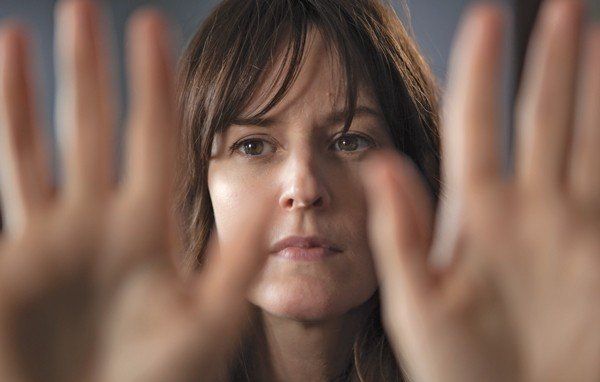One of the many films that premiered in the U.S. Dramatic Competition at the 2013 Sundance Film Festival was director Lynn Shelton’s Touchy Feely. The film centers on a massage therapist played by Rosemarie Dewitt who suddenly develops an aversion to touching skin, and her dentist brother (Josh Pais) who begins to get a reputation as a healer and is unprepared for his immediate success. As the family members (including Ellen Page as Pais’ daughter) deal with their newfound afflictions and admirations, they also discover themselves. The film also stars Scoot McNairy, Allison Janney and Ron Livingston.
Shortly after the film’s premiere at Sundance, I was able to get an exclusive phone interview with writer/director Lynn Shelton. During the conversation, she told me all about her process of crafting the characters and the script, how Allison Janney’s role was almost played by Catherine Keener, why she felt compelled to edit the film herself and about her next project, Laggies which will star Rebecca Hall. Click after the jump to read the whole interview.
Collider: For people who won’t see this film for a little while, could you give a brief summary in your own words of what it’s about?
Lynn Shelton: It’s an ensemble cast with multiple storylines and it’s centered around a brother and a sister, the brother is played by Josh Pais and the sister is played by Rosemarie Dewitt. She plays a massage therapist, free-spirited, enlightened feeling massage therapist who loses her mojo when she develops this mysterious repulsion around skin and touching and suddenly can’t do her job anymore. And that kind of sends her into a bit of a tailspin. Meanwhile her brother is a dentist and he’s got a very boxed-in emotionally kind of stunted aspect and he starts to heal people just as mysteriously, he’s healing people and they’re flocking to him suddenly. He has this dying dental practice and now his waiting room is bulging seeking his healing touch. So that sends him in a kind of different trajectory, he’s on a different journey of self discovery but both of them are basically on a journey of self discovery. Then it’s rounded out by a cast of amazing actors, Ellen Page plays his daughter and Rosemarie Dewitt’s niece, and there’s sort of a tug-of-war going on over her because they both adore her and want different things for her. Ron Livingston is in it, Allison Janney as well and Scoot McNairy is Rosemarie’s boyfriend and their lives all intersect in interesting ways throughout the course of the narrative.
Tell me what your inspiration was behind this story, or behind any of the characters and which came first?
Shelton: The first things were the characters. In combination with the fact that I had just made 3 films in a row with 3 characters and 1 main location and 1 key storyline that all takes place in a linear fashion over the course of about 3 or 4 days. And that’s great, I have no problem with that storyline it’s a wonderful one, I like being able to just turn the microscope on a small number of people, get to know them, drop into their lives for a period of time and I love that but I had done that 3 times in a row and I wanted to do something a little different. And I knew I wanted to try a more expansive tale, I have 15 locations instead of 1, I have more storylines I start weaving them and going back and forth between them.
And also tonally it has a different feel to it as well, instead of banter and dialogue and conversation based or driven narrative, there’s more room for a more meditative scene. There’s quieter scenes with more breath in them because the characters are not, some of the characters are more introverted and have a harder time expressing themselves and are going through a bad time and it just has a very different vibe. And although there are some really big laughs, it’s more drama than comedy. It’s a little bit uncategorizable. I think about Harold and Maude and how you can’t, you have to call that a comedy but I’ve never cried harder in my life at the ending of any movie than at that movie. So it’s just very emotional as well, and I wanted that. I wanted to have a narrative that would allow for the cathartic moment and exploring the inner landscape of somebody’s brain, the cinematic language with music and sound driven tools, as opposed to just dialogue conversation based narrative.
So I was thinking about all those elements and wanting to allow myself some of that territory to explore as a filmmaker and then I had these two characters that were really written for those two actors Rosemarie Dewitt and Josh Pais. I met Josh Pais a while ago, say about 2 years before we shot this movie. And we found we were both mutual admirers of each other and were talking about how to work together and throwing back and forth ideas about a character, and the character we talked about really ended up being this one. And it was a different project originally but then as I was developing this massage therapist character, I realized oh they might be a really nice pair to have next to each other.
So the idea here is, I really had this thought in my head was, what if somebody who had an occupation that worked very intimately with the bodies of strangers on an regular basis, what if they just reached a threshold and they couldn’t do it anymore? Because it’s very intense, skin is freaky bodies are weird and I’ve gotten many massages in my life and for a long time never thought about what the experience was like for the massage therapist, for the person who actually had to be working so intimately on my body and we’d never met before. And they had to do it again and again and again and how strange is that? It’s sort of an interesting occupation, and then I just thought well that person who got into that pickle, and then if their occupation was a large part of their identity what would that do to them, and how would they find their way out of that? How would it shake up their identity? It all sort of evolved out of those characters.
You just said that you did write those characters for those actors, so your casting process must have been pretty easy then.
Shelton: Well for those two it was. And then with Hump Day and Your Sister’s Sister and my second film which actually came before, Touchy Feely is my fifth film, I was really, I pitched the idea of the story quite early on and then worked with the actors to find who these characters were and develop their back-story and get a lot of input from them before I even had the scenario really hammered out completely and a script written. In this case I really wrote much, much more on my own, and brought the actors in later in the process. Josh and Rosemarie were essential components, they needed to be in place and then everybody else came in later, and I wanted to make sure that I left enough room to put their stamp on the characters and have their own input. But it was just a little bit less collaborative, I was a little bit more of a control freak sitting alone in my room and writing than I had been the last 3 films. And it actually was easy, I really did rely on personal connections.
For example, Allison Janney and Ellen Page were both introduced to me by my friend Catherine Keener who was originally supposed to play Allison Janney’s part and she had to drop out because of scheduling, she immediately was so apologetic but she said here, let me introduce you to Allison and Allison luckily was already a fan of Hump Day and she seemed really game and excited and so it was not a hard sell. And she made Ellen Page watch Your Sister’s Sister and luckily it appealed to her so that felt like a very easy, everything worked out. Scoot McNairy is someone I’ve known for years we met at the Independent Spirit Awards in 2009 or 2010, yeah no I guess in 2009 and I’d been in contact with him and knew that I wanted to work with him for a long time so that was a pretty easy phone call to make. And Ron Livingston I met through Rosemarie and Rosemarie and I had already worked together so it did all sort of fall into place in a pretty easy fashion luckily but yeah, I was a little bit farther along and I had written a lot already and except for Josh and Rose I had a lot of the role written already before I had the other actors in.
You’re talking about being a control freak, you also edited the film. How was that? And what was the hardest thing about it?
Shelton: Well I started as an editor so, in the film world I was an actor in the theater in my 20’s and then I went to art school as a photographer and started making experimental films there. So I was making films as a solo artist doing everything, shooting, directing, art design, sound designing and editing. And then my marketable skill getting out of grad school was video editing, which was new at the time, still relatively new so I was able to get a lot of work in New York where I was at the time. I moved back to Seattle where I was originally from, and started working on more and more narrative pieces as an editor and was able to edit two narrative features and lots of narrative shorts. Then when I started making my own films, I really was the editor on my first two films, and couldn’t imagine ever giving that role up to someone else or sharing it with someone. For me, that’s where the true artistry really happens. That’s where I feel I really put my stamp on a film is in the edit room.
So I worked with a fantastic, fantastic collaborator in the edit room, my editor Nat Sanders edited Hump Day and Your Sister’s Sister...and in Seattle we worked together very intensely. But I’m not one of those directors who can just kind of walk away from the edit room and come back and check in, I’m in there with him pretty much the whole time. And it’s great, we make a great team. But I really felt the urge to get back in the driver’s seat. Especially with this film because it was a journey of discovery, it was coming from a different impulse. Because I had been the one to really write it, I don’t know there was something about it that I, there were new things I was exploring and I think I just wanted...to get the idea in my head and it had to go straight through my fingers onto the keyboard as opposed to having to articulate it to somebody else. If that makes any sense. I really just wanted to make it from gut instinct, straight, just try stuff out in the more immediate kind of fashion. The hardest thing about it was being alone in a room for months. It was very lonely and sometimes really frustrating. But I made sure to invite, I had my friends come in that I trust to give me feedback along the way. Even though I was the sole editor I had a lot of feedback and help along the way.
How much of the script changed on set and how much of it was pretty close to the original copy that you had?
Shelton: My first film We Go Way Back was completely scripted and I really felt I wanted to try and experiment with a completely improvised film, which I did then saw that the possibilities of that realm and the levels of naturalism you can reach with that. And so with Hump Day that was kind of an evolution of that initial attempt to do that. Completely, those two films were just an outline with descriptions of what each scene would be. So there was a very hard and fast structure, but there was no dialogue written, it was 100% improvised. So I have to say that the editing room again, that was really where the thing is, a huge part of the writing happens in the editing room. Because the actors give you a tremendous amount of material to work with and then you’re carving and focusing and figuring it all out. Kind of like a documentary in the edit room and really sharpening it all up and...figuring out what the actual point of the scene is and really making it clear. Your Sister’s Sister I actually had lines of dialogue written because I had two non-veteran improvisers on set and I wanted them to feel like there was a safety net, there was something there for them to grab a hold of. But even then Emily Blunt told me she would just look at the scene the night before to just get a sense of the shape of it and then she’d look at it again and then the next day she would show up and we would just go and sometimes they would go completely off the beaten path and find their own way to the meat of the scene, and sometimes they would stick much more closely to the way I’d written it.
I think what we came up with was something like 75%, 80% of it was improvised, and there was probably about 25% of it was as I wrote it. With Touchy Feely I wrote it all out, and again, gave them the choice, I always wanted them to feel a lot of freedom, I always wanted the actors to feel really free to leave the words behind if they weren’t working, reword lines, if they felt like there was impulse they wanted to follow, if it was taking the scene out of order or adding something, that you should always feel free to do that. So it was really fascinating to see what the actors did because none of them were veteran improvisers. I mean Rose had had probably the most amount of improv experience on Your Sister’s Sister and so she was kind of the leader but a lot of times they just wanted to say the lines the way I wrote them which was a great honor to me. And especially cause the scenes were not so bantery, sort of quick, fast rolling off each other kind of conversation. It was much more meditative, there was a lot more breath, a lot of room and so a lot of times they would just stick with the script. I think we figured out it was actually, about the flip side of, if you flip the ratio of Your Sister’s Sister, they told me they thought it was about 75% scripted, 25% improv.
How does it feel for you to be back at Sundance for your 3rd time with a film?
Shelton: Yeah it is my third time! My second time in competition. And I just never thought I’d have the experience of being in competition again. I just wasn’t sure if that happened, I mean James Ponsoldt is here for the third time in competition so I guess I could do it again and I would be happy to do it again and again and again. Yeah my third time overall at Sundance. And I just really feel so grateful to Sundance because I’ve always been an artist and I’ve never been able to make a living at being an artist until Sundance. Sundance was the key for me. The first time I ever intersected with the quote unquote industry or Hollywood or being given a paid job as a director all came because of the reputation I got coming out of Sundance as a veteran Sundance filmmaker. It just changed everything for me. I know what to expect when I come here, in terms of the city, Park City, the little town here, where everything is and there’s a familiarity and a camaraderie and there’s just a real sense of warmth that I get from it. So when I’m here I just love it here. And the audiences are just so fantastic and it was really the place, the only place I could see giving birth to this film. I wanted to put it in front of Sundance audiences before I put it in front of any other audiences. So I was just actually elated and so grateful beyond belief when I heard I was accepted. Just as happy and excited as I was the first time, which I didn’t think was possible but it really, really was. I was so relieved I can’t even tell you.
So my final question for you is what’s next?
Shelton: There’s a film called Laggies that will be the very first film that I shot that I directed that was not written by me. It’s this wonderful writer named Andrea Siegel, and I feel an incredible simpatico with her, I feel like our voices are really similar and very, they relate to each other really well, I think we’re going to work really beautifully together. And I was actually supposed to be shooting that film a year ago in the spring and it got pushed for scheduling reasons and I said I have to shoot something, I’m ready. And so I made Touchy Feely happen really quickly. And now, it really looks good. I think we’re going to be shooting that this year and I don’t want to jinx it but I’m very excited about the prospect of how it’s looking. Yeah, we’ve got Rebecca Hall attached and Anon. Content is producing, and it’s a script that is unexpected and believable and it’s just a great little dramatic comedy and I’m really excited about it.
Click here to catch up on all of our 2013 Sundance Film Festival coverage thus far.

